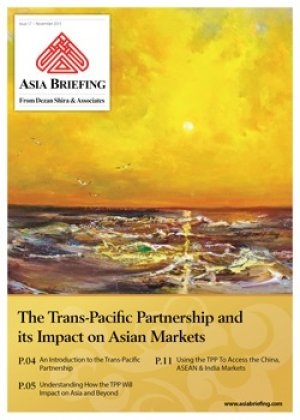The Guide to Corporate Establishment in Myanmar
 By: Dezan Shira & Associates
By: Dezan Shira & Associates
Editor: Cameron Gilchrist
The IMF projects Myanmar to be the world’s fastest growing economy in 2016, with GDP forecast to advance by 8.6 percent. Still considered a frontier economy, Myanmar is at a young but developing stage for foreign direct investment (FDI) within ASEAN. Not only does the nation offer fertile land, bountiful resources, and a strategic geographic location, but the Government is increasingly committed to encouraging foreign investment through major economic and political reforms. The reform process began in 2011 and has successfully increased trade and FDI, contributing to 8.3 percent real GDP growth in the 2013/14 fiscal year, which topped the preceding year’s 7.3 percent growth.
Although reforms have been successful in augmenting Myanmar’s economic growth and attracting foreign investment, the regulatory environment remains complex. In 2012, Myanmar released the Myanmar Foreign Investment Law to address the rights and duties of foreign investors. More recently, Myanmar has seen the passage of the Special Economic Zone Law which was passed in 2014, offering numerous FDI incentives. Further, the 102 year old Companies Act, which serves as the country’s foundation for investment, is currently under revision in parliament.
In the midst of an evolving economic and regulatory climate, it is crucial for prospective investors to understand their responsibilities in Myanmar. Government agencies, namely the Directorate of Investment and Company Registration (DICA), as well as private advisors can play a key role in successful business establishment in Myanmar.
 RELATED: Corporate Establishment Services from Dezan Shira & Associates
RELATED: Corporate Establishment Services from Dezan Shira & Associates
Options for Investment
Below, the steps for registering a private limited foreign company and a foreign company branch office are outlined. These are the two best vehicles for foreign investors to establish profit generating operations in Myanmar. Deciding between a private limited foreign company and a branch office is largely influenced by the desired business function of the company.
Private limited foreign companies can be 100 percent foreign owned and engage in nearly all service provision and manufacturing activities. The industries that allow only limited foreign ownership are listed in Notification No. 26/2016. In most cases, foreign companies must engage a fully domestic company to conduct trade activities in Myanmar. All foreign investors must register their companies with the DICA in order to receive a registration license and Permit to Trade, which allow businesses to commence activity in Myanmar. Foreign companies are also required to register with the Myanmar Investment Commission (MIC) under the Myanmar Foreign Investment Law of 2012 (MFIL) if they plan on receiving investment incentives, which include long term land leases. Small companies that will strictly provide services in Myanmar are not required to register with the MIC.
Branch offices are also allowed to generate profits within Myanmar and represent a viable investment vehicle for certain endeavors. Companies using branch offices are restricted from participation in any of the industries listed in Notification No. 26/2016. However, branch offices are not required to register under the MFIL. Thus, they can register strictly under the Myanmar Companies Act of 1914 and skip approval from the MIC. Because they will use the name of their parent company, branch offices can also bypass a name check. The necessary documentation to register a branch office, however, is more extensive than that for establishing a private limited company.
 RELATED: The Guide to Corporate Establishment in Cambodia
RELATED: The Guide to Corporate Establishment in Cambodia
Option 1: Private Limited Foreign Company Registered Under the MFIL
Step 1 – Name Check
In order to establish an entity in Myanmar, a foreign company must first ensure their desired name is available and appropriate by submitting a name check form to the DICA.
Step 2 – Staffing
Foreign companies must have a minimum of two directors and two shareholders. Unless specified in Notification No. 26/2016, the directors and shareholders can all be foreigners. A maximum of 50 shareholders are allowed.
Step 3 – Register with the MIC
Foreign investors need to submit a project proposal to the MIC in order to receive a Foreign Investment Permit. The MIC should accept or reject the proposal within 15 days of submission. If accepted, the proposal will be reviewed and either approved or denied within approximately 90 days. According to the MIC, proposals are evaluated using three main criteria:
- Compatibility with the policies set out in the Foreign Investment Law
- Financial trustworthiness
- Economic solidity of the company and conformity with existing laws
Before submitting a proposal, foreign investors should secure a land lease and consult the DICA.
The DICA provides a detailed outline of the MIC application process as well as a list of documents required for the application. All forms must be submitted in English.
Step 4 – Register with the DICA
Foreign investors must also register with the DICA in order to officially operate in Myanmar. Once getting MIC approval, DICA registration will be virtually automatic. The documents needed for registration with the DICA and the MIC can be submitted simultaneously. However, the forms for each registration vary. The documents necessary for DICA registration are listed in a detailed outline of the registration process.
If the DICA approves an application, a temporary license will be issued. Before a permanent Registration Certificate and Permit to Trade are issued, foreign investors must confirm their registered office address within one month of receiving approval. Proof of the minimum capital transfer into a Myanmar bank account as well as a signed letter of conditions must also be submitted before the DICA issues a permanent Registration Certificate and the Permit to Trade. The Internal Revenue Department (IRD) will assist with confirming inward capital remittance.
Step 5 – Licensing and Compliance
If no further licensing is required for its intended business activities, a foreign company is allowed to commence business upon receipt of the MIC permit and the DICA permanent license. Inquiries concerning further licensing can be directed to the Company Registration Division of the DICA.
Company Registration Certificates are valid for five years and must be renewed in order to continue business operations in Myanmar.
The DICA provides a general list of investors’ rights and obligations to facilitate fair treatment and compliance with Myanmar law.
 RELATED: The Guide to Corporate Establishment in Malaysia
RELATED: The Guide to Corporate Establishment in Malaysia
Option 2: Branch Office Registered Under the Companies Act
Step 1 – Lease Land
For successful registration, investors must provide the information for their branch office’s future address.
Step 2 – Staffing
Using Form 18, investors must appoint a minimum of one resident of Myanmar to be their authorized person who is able to accept any notices intended for the company. Investors are also required to appoint someone the power of attorney.
Step 3 – Register with the DICA
To receive a Registration Certificate and Permit to Trade from the DICA, investors must submit registration forms available on the DICA’s website. These include the company’s annual report or audited financial statements for the previous two years, the Memorandum and Articles of Association and the appointment letter/power of attorney for authorized persons, all three of which need to be notarized by the company’s resident authorities and local Embassy of Myanmar. All forms must be delivered in English.
If the DICA approves the application, a temporary license will be issued. Before a permanent Registration Certificate and Permit to Trade are issued, foreign investors must confirm their registered office address within one month of receiving approval. Proof of the minimum capital transfer into a Myanmar bank account as well as a signed letter of conditions must also be submitted before the DICA issues a permanent Registration Certificate or Permit to Trade. The IRD will assist with confirming inward capital remittance.
Step 4 – Licensing and Compliance
If no further licensing is required for its intended business activities, a branch office is allowed to commence business upon receipt of their DICA permanent license and Permit to Trade. Inquiries concerning further licensing can be directed to the Company Registration Division of the DICA.
Company Registration Certificates are valid for five years and must be renewed in order to continue business operations in Myanmar.
The DICA provides a general list of investors’ rights and obligations to facilitate fair treatment and compliance with Myanmar law.
Further Support from Dezan Shira & Associates
Corporate establishment can prove a complex and challenging procedure, particularly in a country with emerging regulatory standards, such as Myanmar. With decades of experience helping companies set up businesses in the region, specialists at Dezan Shira & Associates are well placed to help overcome these challenges. For more information, please get in touch with our advisors at asean@dezshira.com.
|
Asia Briefing Ltd. is a subsidiary of Dezan Shira & Associates. Dezan Shira is a specialist foreign direct investment practice, providing corporate establishment, business advisory, tax advisory and compliance, accounting, payroll, due diligence and financial review services to multinationals investing in China, Hong Kong, India, Vietnam, Singapore and the rest of ASEAN. For further information, please email asean@dezshira.com or visit www.dezshira.com. Stay up to date with the latest business and investment trends in Asia by subscribing to our complimentary update service featuring news, commentary and regulatory insight. |
Annual Audit and Compliance in ASEAN
For the first issue of our ASEAN Briefing Magazine, we look at the different audit and compliance regulations of five of the main economies in ASEAN. We firstly focus on the accounting standards, filing processes, and requirements for Indonesia, Malaysia, Thailand and the Philippines. We then provide similar information on Singapore, and offer a closer examination of the city-state’s generous audit exemptions for small-and-medium sized enterprises.
 The Trans-Pacific Partnership and its Impact on Asian Markets
The Trans-Pacific Partnership and its Impact on Asian Markets
The United States backed Trans-Pacific Partnership Agreement (TPP) includes six Asian economies – Australia, Brunei, Japan, Malaysia, Singapore and Vietnam, while Indonesia has expressed a keen willingness to join. However, the agreement’s potential impact will affect many others, not least of all China. In this issue of Asia Briefing magazine, we examine where the TPP agreement stands right now, look at the potential impact of the participating nations, as well as examine how it will affect Asian economies that have not been included.
 An Introduction to Tax Treaties Throughout Asia
An Introduction to Tax Treaties Throughout Asia
In this issue of Asia Briefing Magazine, we take a look at the various types of trade and tax treaties that exist between Asian nations. These include bilateral investment treaties, double tax treaties and free trade agreements – all of which directly affect businesses operating in Asia.













